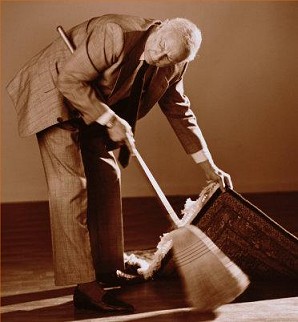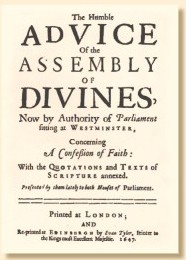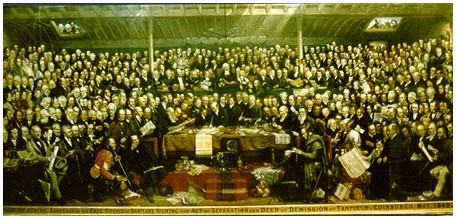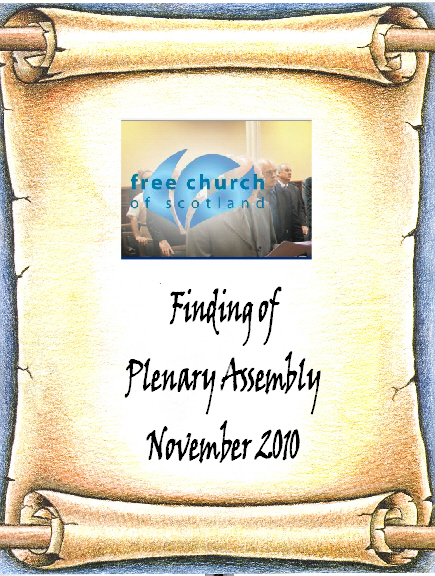Sweeping it under the carpet
In the life of many organisations it is often the case that serious and deleterious flaws remain suppressed and hidden until some other issue arises. It is at that point that foundational cracks are exposed. And in the church(es) it is no different.
 THE recent problem facing the Free Church of Scotland has produced an outcome which has ramifications extending far beyond that denomination. THE recent problem facing the Free Church of Scotland has produced an outcome which has ramifications extending far beyond that denomination.
At a ‘top level’ the outcome relating to the recent songs/instruments debate was the right decision (giving primacy to the local churches) albeit taken for the (secondary and expedient) reason of preserving the denomination as a cohesive whole.
The impact on denominational integrity and cohesion remain to be seen, but the very positive effect of the debate has been to ‘lift the rug’ and expose much of what has been swept beneath the carpet for centuries and through to the present day.
In a recent article which asked the question ‘Are denominations dying Gods’ all the ‘bullet points’ contained within surfaced during this month's Plenary Assembly in Edinburgh.
It is hoped to produce a series of articles shortly which will look into these issues in greater depth. However, for the moment, a quick look at the background, decision and possible implications for the Free Church as a denomination and for the wider church(es) beyond.
Scottish Presbyterianism
and the Free Church of Scotland
The Free Church was formed in 1843. Up until that point the main protestant cohort in Scotland was contained within the Church of Scotland which formed up in 1560 as a direct result of the Reformation in Scotland. John Knox and his protestant followers did not want to form a new church; indeed that idea of two churches was anathema to all both the Protestant and Catholic camps. (One wonders how Knox would view the present scene.)
The 16/17th centuries
 Just over 100 years after the events of 1560, England was embroiled in a series of civil wars and the Scots Protestants regarded these conflicts as an opportunity to take their Reformed Presbyterianism into England. In return for Scottish military support the English gave an assurance to derive a new set of creeds and structure for the Protestants in England, many of whom were puritan and anti-royalist. The agreement was drawn up as a Solemn League and Covenant. Just over 100 years after the events of 1560, England was embroiled in a series of civil wars and the Scots Protestants regarded these conflicts as an opportunity to take their Reformed Presbyterianism into England. In return for Scottish military support the English gave an assurance to derive a new set of creeds and structure for the Protestants in England, many of whom were puritan and anti-royalist. The agreement was drawn up as a Solemn League and Covenant.
From 1644 to 1648 a group of English divines along with six representatives from Scotland drew up a doctrinal document entitled the ‘Westminster Confession of Faith’. Although adopted in England it was abandoned there shortly afterwards (Note 1). However the Confession became the ‘subordinate standard’ for the Church of Scotland and has been ever since. From that time it has become the ‘doctrinal touchstone’ for Presbyterian churches the world over.
19th Century Disruption:
the formation of the Free Church of Scotland
 Fast forward now to the first half of the 19th century. Many leaders in the Church of Scotland had become increasingly disturbed by what they saw as the intrusion of the monarch and/or the state into church affairs (Erastianism). Fast forward now to the first half of the 19th century. Many leaders in the Church of Scotland had become increasingly disturbed by what they saw as the intrusion of the monarch and/or the state into church affairs (Erastianism).
Additionally the practice of feudal landlords having the right to choose and appoint church ministers (Patronage) was also causing serious concern.
As a net effect of these troubles around one third of the Church of Scotland (ministers, elders and people) left the Church of Scotland to form the Free Church of Scotland. Subsequent splits and reunions have produced a very messy history of church development through to the present day.
[ See article ‘Presbyterianism Scottish style’ which includes a sorry ‘road map’ from 1560 onwards. A copy of the chart in that document annotated to show the Free Church over the centuries is available by clicking here.]
21st century Free Church
Most recently a substantial number (minister, elders and people) left the Free Church in 2000 to form the Free Church of Scotland (Continuing). Although the rupture focussed much on disagreements regarding how a disciplinary case was handled, in essence, serious tensions of a ‘progressive v traditionalist’ form lay just beneath the surface. The fact that the person involved in the discipline case was a leading light in the ‘reform’ stable further ‘politicised’ the whole affair.
The split had the effect of removing from the Free Church many leaders and members who were generally older and more traditionalist in leaning. This left the residual Free Church depleted, insecure and also with a larger percentage of progressives in the ranks.
[ As a previous article outlined, the nature and composition the Free Church had and has become very varied in term of demographics, culture, language and background; and this exacerbated the reform/traditionalist tensions while rendering consensus more elusive and difficult to achieve.]
Brought to a head in 2009/10
Pressures for reform increased, and during this period at least one local church whose minister was at the leading edge of 'change', introduced hymns songs and musical instruments into Sunday evening services. This was regarded as both a provocative and embarrassing move by and for the Free Church as a whole, as it drove a coach and horses through prevailing church law relating to ‘worship’. The innovation was introduced by given these evening services the title of ‘fellowship meetings’ as opposed to ‘worship services’: a play on words which adhered to the letter of law while flouting the spirit of the law.
The Plenary Conference and Assembly: crunch time
 In August 2010 an extraordinary Plenary Conference was held in Dingwall as an opportunity for open debate on the issue of whether or not to permit the singing of ‘uninspired praise’ and the use of musical instruments. In August 2010 an extraordinary Plenary Conference was held in Dingwall as an opportunity for open debate on the issue of whether or not to permit the singing of ‘uninspired praise’ and the use of musical instruments.
Subsequently a ‘Deliverance’ was taken to the floor of an extraordinary Plenary Assembly (all ministers and an equal number of elders) in Edinburgh on 18/19 November 2010. [This plenary assembly was only the second such gathering in the history of the denomination: the first having been at its inception.]
Following full discussion, which was by all accounts amicable, a vote was taken. The out-turn showed a 98/84 split in favour of adopting spiritual songs and instruments; with each congregation being allowed to decide on whether to maintain the status quo or opt for the new freedoms.
------------
The Genie is now out of the bottle
It is too early to see how all this will work within the Free Church but what can safely be said is –
-
The decision to allow local congregations to decide on this important issue surely raises the whole question of local autonomy and the place of over-arching bodies such as presbyteries and a General Assembly on other matters.
-
If local congregations are now given licence over this (seen-as-a-very-important) issue, then to what extent should this principle be applied to other features of church form and practice?
-
The fact that the count on the day was split very well illustrates the inherent flaw in the procedure of using ‘voting’ as a mechanism to determine the will of God. The Holy Spirit is not double-minded. And the last time that we see ‘lots being drawn’ in the pages of Scripture was prior to the formation of the church at Pentecost (Acts 1:26). From that time on the Holy Spirit provided the daily guidance. (cf Acts 13:2) (Note 2.)
-
The concept of what constitutes worship is seriously misrepresented (even misunderstood?), artificially prescribed and – in terms defined by the WCF – irregularly practiced (Note 3. )
-
The Bible on its own is not sufficient under the new covenant as the arbiter in every situation. (And this has been well illustrated by the various and conflicting statements and views – all expressed by Bible-believers – in this present issue.) Whilst the Holy Spirit will never contravene the principles and directions given by God in and through His word, the third person of the Godhead is the primary means employed by God the Father in directing His children on issues which are not prescribed by or defined in the Bible itself ( John 16:13/14).
-
Inasmuch as the denomination has made a significant departure from its historical norms any legal cases arising between the Free Church and the Free Church (Continuing) will see the latter on much firmer ground regarding claiming to be the ‘true’ Free Church.
-
Self-evidently, vows to maintain current forms (laws and practices) render any change impossible without causing serious disruption. This places any denomination worthy of the ‘semper reformanda’ (always reforming) maxim in a philosophical and political bind.
Bedrock issues
 The underlying, and even more fundamental matters which the debate brought to the surface are potentially much more serious for the Free Church, the Presbyterian church worldwide and indeed many churches (both modern and traditional) which are not of the Presbyterian fold. The underlying, and even more fundamental matters which the debate brought to the surface are potentially much more serious for the Free Church, the Presbyterian church worldwide and indeed many churches (both modern and traditional) which are not of the Presbyterian fold.
One of the very profound and important issues which Presbyterian churches are choosing to ignore is the extent to which traditions, anachronistic church laws, and the deficiencies and errors in the Westminster Confession of Faith are producing unsustainable hypocrisies, loopholes and unbiblical practices and constraints into regular church life. (A question put to the Free Church in 1989 has never received an answer.)
God sees under our carpets
Many local churches and denominations not least have been brought very low and even destroyed by expediently choosing to ignore serious problems and seeking to ‘cover these over’ in an apparent belief that they are thus rendered invisible to the Almighty and Lord of the church. (cf Ezek 13:10-16; Matt 10:26) Meanwhile legalism and mere tradition, bolstered by out-moded man-made rules are combining to bring many groupings to the point of ruination. (Note 4.)
An observer at the Plenary Assembly concluded his review by saying:
“One final thing that became clear in the debate was that the Free Church does not have a clear definition of public worship.” ( Note 5.)
The whole psalms/instruments debate has exposed enough serious questions to keep Plenary Assemblies going for a long time. But at least the process might now be underway.
We certainly don't want another denomination (God will already be displeased enough with our history). But mere 'denominational realignment' will just not do: this would be tinkering at the edges. If Knox were with us today he would probably be leading another Reformation; and correcting the inherited deficiencies of the last one.
Note 1. One of the main tensions between the Scottish Presbyterians and the English Puritans related to the differing views of who (on earth) should be at the head of the church. Most of the Puritans felt it should be the parliament (i.e. the state); the Church of England and the King (Charles I and II at that time) saw the sovereign as head (under King Hendry VIII’s ‘Divine Right of Kings’); whereas the Scots eschewed both of these views proclaiming Christ Jesus the sole head of the church.
Note 2. Reference is often made to the dispute between Paul and Barnabas regarding whether or not to take John Mark with them on a mission. No satisfactory explanation has been given for this event, however it is altogether possible that they BOTH missed the leading of the Holy Spirit who might have saying to these men that it was time to launch out in two different directions. It is a common mistake to presuppose that yesterday’s format will pertain indefinitely.
Note 3. Worship is essentially from the heart, and it is a dynamic – which may outwork in a tangible and physical expression – of praise, thanksgiving and adoration. We find worship of Father/Son under the new covenant referred to at the level of an individual (Matt 8:2; John 4:21; 1 Cor 14:25; Rev 19:10), small group (Matt 2:11; Matt 14:33; Matt 20:20; Acts 13:2) and the whole assembly (Luke 14:10; Rev. 4:10). Nowhere in the Bible is there found a prescription for when, where and how worship might take place under the new covenant. These OT laws were confined to the old covenant. What happens in a church building on a Sunday morning in a gathering of God’s people might include worship; but there is no guarantee that worship is taking place just because a ‘call to worship’ has been made. Nor, if worship does take place does it necessarily end with the Benediction being pronounced. Moreover, corporate worship might spontaneously break out – and often has – amongst a small gathering in (say) a home on any day of week and at any hour.
Note 4. Whatever the ill-effects of anachronistic practices, there are many traditions which are good and should be sustained. Conversely there are some innovations coming into today's church which are carrying subtle heresies and deviant influences. Discretion is a key requirement for the days in which we live (Matt 24:4). See article ‘Truth, Error and Deception'.
Note 5. The term ‘public worship’ is an artificial term. And it is at this point that we come to the afore-mentioned Westminster Confession of Faith which ‘Of Religious Worship, and the Sabbath Day’ (XXI/V) states:
The reading of the Scriptures with godly fear, the sound preaching and conscionable hearing of the Word, in obedience unto God, with understanding, faith and reverence, singing of psalms with grace in the heart; as also, the due administration and worthy receiving of the sacraments instituted by Christ, are all parts of the ordinary religious worship of God: beside religious oaths, vows, solemn fastings, and thanksgivings upon special occasions, which are, in their several times and seasons, to be used in an holy and religious manner.’
The above could easily be dissected on a significant number of points; but suffice to say at this juncture it is not likely that there is any Free Church congregation which includes the Lord’s Supper at every ‘worship’ service. However there is a much bigger question relating to how the Lord's Supper is observed. Current practice has strayed far from what Christ modelled to his disciples on that pre-crucifixion evening. [More later d.v.]
|
Christians Together, 05/12/2010
|
(page
1
2
3
4)
| |
|
Martin Lisemore |
28/12/2010 20:45 |
Rob, I thank you.
My stand here, and for very many years, is, let's get back to a New Testament Church of believers, let's have the offices in places and fully use the gifts of the Holy Spirit, as we are led by Him.
Let's do away with priests in frocks, because we are all priests, a royal priesthood, a holy nation ...
Let's just do it all the way Jesus wanted. Then, and only then, will we see prosperity. People gloriously saved, people delivered and healed, buildings filled with praising believers, and a power in the nation that none may refute or stand against.
Let's just try it, prove Jesus right?
I'm up for it, are you all?
|
| |
|
Peter Carr |
28/12/2010 20:59 |
"let's get back to a New Testament Church of believers,"
Jesus, Paul and others often quoted from and referred to the Old Testament. The whole counsel of God (Old and New Testaments) is required for individual Christians, as well as churches if we are to be faithful to all that God is and wants us to be!
|
| |
|
Martin Lisemore |
28/12/2010 23:41 |
Peter, my brother, this sounds like a dumbing down of what I wrote, a dilution. That doesn't sit well with me, and thus the following ...
It may well be why we are all, without exception, without true spiritual power, without dunamis, without a voice and disappointing Jesus. It is not going to be enough to say, my denomination said ... when He has provided all we need, and all we could want in any ministry, in any situation and that for all time. God is not poor. He has already provided for all He wants of us. (I've never seen a thousand hills, but I believe the Bible).
Did Jesus go to the cross for what we call church now? I don't think so! A Church riven with denominations, fractured and sundered by doctrinal differences. I could say contrived differences and exemplify that. So much so we may barely speak to each other. Believe me I know what I'm talking about. I've been around the block, many times. I could refer to the New testament period, Pharisees and Sadducees.
I believe with all my heart and my soul, in all of my being, when we are willing to meet under one banner, that of Jesus of Nazareth, crucified dead and buried, resurrected and ascended, when we are willing to employ the gifts of the Spirit, in combination with the offices Paul laid down for us, when we are truly willing in our hearts to bring down the denominational barriers which divide the Body, which build artificial walls of separation, then, and only then, will we see, live, experience, the true and dynamic power of a New Testament Church to change the world in which we live.
Isn't that what we are all praying for, Godly change?
The trouble now is, I'm a Church of Scotland, and I'm a Baptist, and I'm a Methodist and I'm a ... Peter, I ask you, how does this stack up at our judgement? What are we going to say? I'm a ...
I refer you to the parable of the talents.
Fear not, albeit I'm a Southerner, I love you all, and that in Jesus Name. I don't care what you are, or who you are, I care what you can be. What you can be in Jesus.
I write this, not with my Pentecostal hat on, or my Charismatic cap; I write as an individual who has read, re-read, and yet again, re-read the Scripture, often in tears.
Yes, take the whole counsel of God, unpack it, examine it, and that closely, very closely. Look at Elijah, Elisha, David, Gideon, Samuel, oh! There are so many ... They took our God, the Most High God, at His word. We have so much more, we have Jesus, the Living Word and the incarnate Word, so much more than these men had.
Why do we find it so difficult?
Why are we Baptists, Methodists, Church of Scotland or Church of England or whatever?
Aren't we Christians? Aren't we believers? Aren't we one?
So why truncate what Jesus bequeathed us? His bequest cost Him His life, and that on a cross.
Peter, in all heart and honesty, give me a Scripture to prove me wrong. Don't cop out, Peter. Give me a Scripture which is consistent with other Scriptures, both Old and New Testament, one which carries the very mind of God in this matter. Prove me wrong!
In Jesus Name. Amen and Amen.
|
| |
|
Peter Carr |
29/12/2010 07:49 |
"What are we going to say? I'm a ..."
Martin, brother! I can only say what I am and intend to be by God's grace (more like Jesus). I cannot speak for others, but can only be faithful to what and who God is calling me to be.
The situation is what it is, so we have to learn to live with it and operate within the confines of the reality of what it means to be a Christian in 21st century post-Christian Britain!
Many would say that the church is in excile, that the Lord (for His own reasons) has withdrawn His Spirit to some degree. If so, that presents us with a different dilema. Not how to be what we cannot possibly be, but to be what God is calling us to be despite the compromise all around, both inside and outside the church.
You asked for Scripture, well here is one that stands the test of time from the 1st century 'til now and until He returns;
Matthew 28:18-20 (New International Version, ©2010)
"Then Jesus came to them and said, “All authority in heaven and on earth has been given to me. Therefore go and make disciples of all nations, baptizing them in the name of the Father and of the Son and of the Holy Spirit, and teaching them to obey everything I have commanded you. And surely I am with you always, to the very end of the age.”
|
| |
|
Editor |
29/12/2010 09:51 |
In the context of the above discussion I have placed an earlier article on the home page (if that's of any help in discussing characteristics). It's called 'What to look for in a Church'.
|
| |
|
Martin Lisemore |
29/12/2010 21:56 |
Peter, you are so gracious, I have much to learn from you. Would that I may sit under your ministry and receive of the Lord Jesus through you. That's a very big Amen!
Peter, please understand, my reply is not directed at you, or your ministry; I believe that will become clear as I write. And I write from my in-most being, my bowels, from clear and utter conviction.
Allow me also to make clear, I am not a Restorationist, nor a Judaiser. Neither am I a fundamentalist, or any other well meaning off shoot of the main stream. However much I dislike labels, the only one which comes near describing my convictions is re-constructionist. Taking what is, and at the instigation of and under the direction of, the Holy Spirit, participating, being used in forming what Jesus intended as a Church, a Bride. Allowing the Holy Spirit to re-create, enliven, upbuild, and yes, restore Christ's Body, the Church, in the way only He knows, and only He has the power to accomplish. The Holy Spirit takes no glory for Himself, but glorifies Jesus.
I speak only of the Holy Spirit, the third Person of the Trinity, and none other. The promised Comforter.
Church history records, whenever there has been a move of the Holy Spirit on an area, a people, a church, the result is true worship, praise, thanksgiving and utter joy. Spontaneous, the dynamic from the soul, better, from the very bowels of man. Churches are formed, and others re-formed, with the Gifts of the Spirit in place, offices are designated in line with the Scripture. The Gospel of repentance and faith is preached accompanied by miracles. Just as Jesus said.
Such Churches have a clear message for the world about them. A precise and absolute distinctive. Repent and believe; they have the miraculous in deliverance and healing, words of knowledge, wisdom etc., Jesus said believe, if only on the evidence of the miracles. Where are the miracles? Where is the compelling message that caused thousands to flock to hear the Sermon on the Mount? Where is the overwhelming message that John Wesley preached for sixty years which drew such crowds?
When Jesus spoke on the Mount He was already an anti-establishment heretic.
There is a self evident hunger among people for spiritual awakening; why else did Toronto get going, and persist, regretfully, to this day? Why does God TV on Sky attract some of the highest audience figures for the thousand channel satellite? And much of God TV is, well, I'll be kind here, Godless, dollar driven, rubbish.
Dear Brian Ross the other day pointed out we in the Church are not sufficiently different from people in the world. The world has so invaded the church as to make it all but impotent. We have little or nothing to offer them. And we have all allowed it to happen. We Christians are all, to a man, the inheritors of the weakness and unbelief which has gone before. It's for us, we who are so convicted, to make the difference. Dare to be different.
Peter, your fourth paragraph reads to me like a cry from the heart; it's one I share with you daily. Let people say Jesus has withdrawn His Spirit to some degree; they're wrong! They are so wrong! Too many Scriptures contradict that. It is we who have moved, not Jesus. He is as faithful now as He ever was. He is the same yesterday, today and forever.
As a nation we have lost the torch of preaching the Gospel to the world, it passed to America, and now to Africa. And I must say, I can seldom understand our African brothers speech.
Jesus may have lifted His hand from this nation, bringing it under judgement in a general judgement of the nations, that I can accept because of our record in dealing with the Jews and Israel the Land. Because also, of our corporate unbelief and dead formalism. But His Spirit is still very much with the believer.
I put it to you, Peter, my brother in Christ, whom I love, the moment a body of Christians, however small, turns to Jesus, speaking from the very core of their being, admits their failures, weaknesses, unbeliefs, prejudices towards other denominations; faces genuine repentance, then He who is above all, will meet us where we are.
I am not a theologian, Bible scholar or ordained minster. I do not accept this 21st century is any different from any other century. I do see, however, churches and fellowships which are ill equipped to deal with the challenges of this century; an ill defined Jesus, a weakened Gospel, and a tendency to roll over.
Peter, where would we be now if Jesus had said in Gethsemane, I'm not going to the cross, it's the first century and everything is different? Please accept, I'm not getting personal here, I hear this all over. I just don't accept the Jesus I know has changed. He is the same, the Holy Spirit is the same, and the tools, offices, gifts and weapons of the New Testament are ours for the believing and receiving. They are complete, more than adequate and timeless.
Your Scripture above is perfect. Thankyou. I can only say, He gave us the means to do it in His name.
That's where I stand.
|
| |
|
Paul Whitworth |
31/12/2010 01:40 |
Martin, what about the 7 churches of revelation. They are 7 distinct groups within a relatively small geographic area with differing strengths and weaknesses.
Is that not what we have in these last days, just duplicated around the world? And isn't the message to these churches one of repentance?
|
| |
|
Editor |
04/01/2011 16:34 |
I have removed several posts from this thread as they were becoming a distraction.
|
| |
|
Ewan W. Wilson (Guest) |
22/03/2011 00:19 |
The sly attack on Presbyterianism and the seeming promotion of independency as the better way does not impress some of us. The fond idea that Independents of various types are more unified and have better cohesion and fellowship does not bear closer scrutiny. Radical independency often results in local despotisms and no redress for wrong parties. It splinters the church as well.
Scripture IS the sufficient rule for all true Christians. To suggest otherwise is to vaunt up church law and personalities, Roman style- not that THEY are genuinely unified, anyway. Masses of internal tensions there!
The Free Church fathers wrote the Worship Acts and Vows deeply into the Constitution precisely because they were utterly convinced it was Biblical. Ordination vows, like any vows, should NOT be taken lightly. They have been in the Free Church for too long, but it has escalated since the 2000 split. IF the vows are perceived to be mistaken there IS a perfectly good mechanism to correct to a more Biblical position. It has not happened here.What happened here was 'entryism' pure and simple by folk taking vows they did in the slightest ever believe. God will not hold them guiltless for the subsequent mess they have created, I say it solemnly.
The 2000 split WAS about an issue of Discipline, and about this pure and simple. That more 'conservatives' than 'liberals' stood for the rights of a fair hearing in the Church courts may simply indicate that the conservatives are more sensitive to their pastoral and oversight responsibilities.
|
| |
|
Paul Whitworth |
22/03/2011 12:13 |
'The sly attack on Presbyterianism and the seeming promotion of independency as the better way does not impress some of us.'
I doubt it was meant to Ewan.
The issues facing the Scottish churches cannot be fixed by theologically scrubbing and polishing the church silver, its way too tarnished for that! It's not fit for purpose.
|
(page
1
2
3
4)
|
|